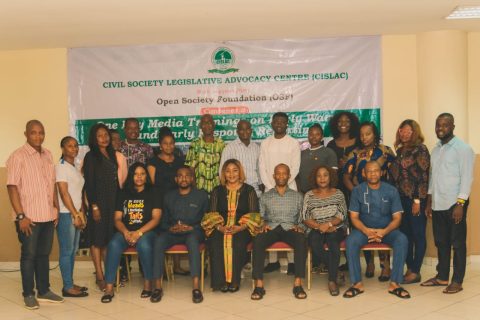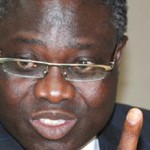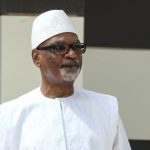Conflict: CISLAC, Trains Enugu Journalists On Early Warning, Response Reporting
Latest Headlines, News Across Nigeria Saturday, April 29th, 2023
(AFRICAN EXAMINER) – A one day media training on early warning and response reporting put together for Journalists in Enugu by Civil Society Legislative Advocacy Centre (CISLAC), has ended with a call for robust synergy between newsmen and relevant Stakeholders.
The organization equally stressed the need for building synergy through formation of an Emergency Response team led by the media comprising relevant authorities to enhance coordination and confidentiality in information sharing on Early Warning and Early Response process.
In his remark, at the event held Thursday in Enugu, Executive Director of (CISLAC)/Transparency international in Nigeria, Mr. Auwal Ibrahim – Musa (Rafsanjani) explained that the training, organized in collaboration with Open Society Foundation (OSF), was put together with a view to building the capacity of participants on issues concerning early warning response and Reporting, especially in the present day Nigeria characterized by various forms of conflicts.
He said: “The Civil Society Legislative Advocacy Centre (CISLAC)/Transparency International (TI) in Nigeria has been advocating adequate reform in the Defence and Security sector since 2014 through various projects focusing on strengthening Citizens Participation towards Peace and Security, Reconciliation and Stability in Nigeria engaging state and non-state actors towards the passage, ascent an implementation of the national IDP Act in Nigeria; “Increase transparency and accountability in the Defence sector, Protection of Civilians in armed conflict and Civilian Harm Mitigation (POC-CHM);
The organization he added has been “Building community Resilience and Social Protection in the North East.
Acording to Rafsanjani, who spoke through CISLAC Senior programme officer, Mrs. Bertha Ogbimi, “Throughout these interventions, CISLAC/TI-Nigeria had conducted series of High-Level engagements with Defence and Security agencies, Members of relevant Committees in National Assembly, Executives, Civil Society, Media groups as well as other state and non-state actors at national and state levels.
“While these intervention without doubt provoked discussions around Defence and Security reform with appreciable policy response, the criticality of initiating Early Warning Early Response mechanisms, especially at community levels as proactive measures to conflict prevention was highly recommended by stakeholders.
He noted that “effort to bridge this lingering gap brought to the limelight, the ongoing project with specific focus on Strengthening Capacity, Advocacy, Accountability and Local Engagement towards Developing Early Warning and Early Response Mechanisms to Enhance Protection of Civilians in Nigeria implemented by CISLAC/TI-Nigeria with support from The Open Society Foundations Africa (OSF-Africa).
“As you are not unaware, every part of Nigeria currently battles with evolving epidemy of multi-dimensional security threats and the South East region is not exempted.
“This calls for more collaboration, communication, coordination and collective support for early warning and conflict prediction mechanisms, which are central in conflict prevention.
“We on this note observed that an EWER system cannot be effective without strong connection between civil society and the key stakeholders, such as policymakers, to carefully monitor the indicators and elicit positive responses, while de-escalating the potential crises.
“It is on this background that we acknowledge and commend the essential role of the Media as a major stakeholder in conflict detection, prevention and response in Enugu state.
“Under the project, CISLAC/TI-Nigeria will be complementing this role by building a well-informed and vibrant EW Community Observers in the state representing the South East to enhance collaboration, build trust and ownership with your esteemed institutions using the EW system as a vehicle in crisis prevention.
The Workshop aimed at building capacity of the media on accurate and verifiable Early Warning reporting through enhanced collaboration, communication and coordination that support Early Response mechanisms, was attended by over twenty Journalists from different media outfits. Our Correspondent reports that the training had a technical session with paper presentation titled: ‘The Role of the Media in Building Effective Early Warning and Early Response Mechanism for Communities – Conflict Sensitive and Objective Reportage delivered by Professor. Michael Ukonu of the Mass Communication Department, University of Nigeria Nsukka UNN.
After brainstorming exhaustively on various thematic sessions, the participants made some observations and recommendations contained in a Communique produced at the end of the workshop.
They noted that “as human explores and harnesses her natural environment, it becomes imperative to establish and empower social institutions such as media to uphold social stability through accurate and verifiable reporting.
“The nature of Constitutional powers accorded the media coupled with social expectations has positioned the journalists as emergency specialists in accurate reporting of both natural and man-made disasters.
Professor Ukonu’s presentation which forms part of the Communique, posited that significance of journalists in Early Warning and Early Response is anchored on efficient capacity that answers critical questions like how to anticipate, manage and report conflict.
“As social change triggers the cycles of social evolution and social conflict, it becomes paramount to activate Early Warning and Early Response system supported by the accurate and factual media reporting.
“Early warning and early Response reporting extends beyond usual reporting functions by journalists to in-depth issues like ability to identify, collect, analyse and contextualise information/data through well-informed social mobilisation and socialisation process.
“Related conflict strata in Early Warning signals for observation and monitoring for appropriate reporting systems include local communities, communication and media, politics and governance, environment, religious, education and health.
“Unattended critical social markers and unregulated public sensitisation constitute a potential conflict signal for appropriate attention to elicit adequate preparedness and response.
The Communique, stressed the need for overcoming inherent clogs in Early Warning Early Response reporting process through avoidance of sensationalism, political pressure, economic pressures, organisation structures and profit seeking tendency.
“Observing natural process of change in a specific sphere or Reporting Desk to ascertain critical points that germinate into the tipping points in Early Warning and Early Response reporting process.
“Identifying and understanding the actions and response by human actors/social markers to efficiently monitor outcome in relation to conflict signals; and deploy appropriate Early Warning reporting.
“Verifiable information collection on the flashpoints with persistent monitoring of possible sources of tension through exhaustive analysis and factual information sharing.
“Adopting a centralised Early Warning Early Response reporting system leveraging virtual platforms to harness input from citizens for harmonisation into EWER reporting.
” Gender sensitivity in Early Warning Early Response information gathering and reporting process to protect the rights and dignity of women and other vulnerable groups.
“Strengthening the media Early Warning Early Response system to promote factual information sharing, extensive outreach, and due diligence in reporting process.
They also harped on mapping and identifying critical stakeholders and their relevance to the EWER process to match Early Warning signals with appropriate response mechanisms in media reporting.
“Building synergy through formation of Emergency Response Team led by the media comprising relevant authorities to enhance coordination and confidentiality in information sharing on Early Warning and Early Response process.
The Communique was signed by CISLAC boss, (Rafsanjani)and two participants, Ifeoma Chukwu Nwabufo of Urban Radio, Enugu, and Comrade Nnamdi Mbawike of Leadership Newspapers.
Related Posts
Short URL: https://www.africanexaminer.com/?p=87507






















